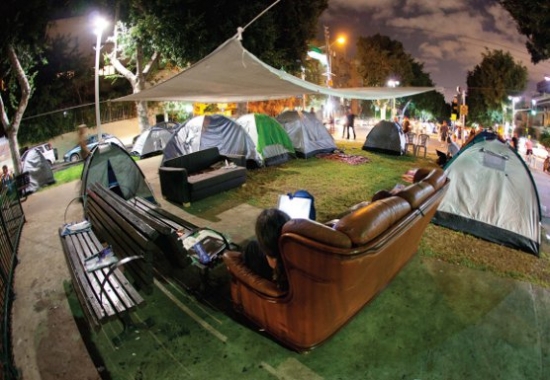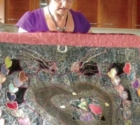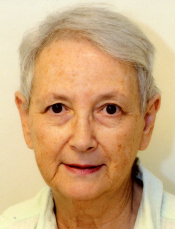
Photo by Yoram Rosenbaum
Spoiled rich kids is the epithet often applied to tent city dwellers and their supporters.
I was fortunate to speak to two young people who are involved, in different ways, with the tent city along Rothschild Boulevard, Tel Aviv.
Noa Hochman, a drama therapist, was born in Jerusalem and grew up in Tel Aviv and Ramat Gan. Her parents were born in Israel, and her grandfather was a pioneer.
Noa describes herself as modern orthodox. After electing to do two years of national service, she worked in an underdeveloped area with people from deprived backgrounds. Often she played with the babies, using puppets to amuse them, encouraging parents to do the same. This was an early indication of her interest in drama therapy, although she’s the first to admit that it took some time for her to realize her career direction.
Noa studied in Haifa, Kfar Saba, south Tel Aviv and Beersheva, gaining an MA in gerontology. As a drama therapist she is associated with the art and dance therapists, and visits the art therapy tent, on the corner of Nachmani and Rothschild. She says that this is the first time people can express their frustrations over the economic situation. She also protests against the bureaucracy she struggled against for some years before gaining a recognized certificate.
Noa moved to Tel Aviv a year ago. She and a roommate had shared a four-room apartment, including a large salon, in Ramat Gan. In Tel Aviv she has a one-room apartment in a previously large apartment split into three, and pays double the rent she paid previously - her main reason for being part of the tent city protest. She is presently involved in a gerontology project, working with seniors and contacting them regularly by phone.
She is ambivalent towards the tent city. On one hand, she supports the demand for social justice. On the other hand, she feels not everyone is represented: for example, those who lost their houses and their work in the withdrawal from Gaza. She wonders whether this protest movement will slowly die out, as happened with the hippies of the ‘60s. Is this really a social protest? With popular singers performing at demonstrations? With guitar-playing tent dwellers? A newspaper article claimed that the protesters are becoming bored, and are going on vacation.
“Politically, I am not right or left. I’m in the center. I want a general social community movement for social justice, not a big Woodstock. But this may be the wrong way to see what’s happening in the tent city. People think that everyone in Tel Aviv is interested only in fashion, in sitting in coffee shops, and being self-centered. This is superficial. Tel Avivians care for each other. The tent city is proof of this.”
Tal Gonen is a Tel Avivian born and bred, with Israeli-born parents. Now in her final year of secondary school, Tal has joined the tent city protest wholeheartedly.
She is very aware of the important part politics plays in our everyday lives, and is prepared to stand up for what she believes in.
I asked Tal, still at school, why she joined the tent protest. She explained that in a few years she will be paying rent and will be feeling then what the protesters today are feeling about the economic situation.
What in particular is Tal concerned about? Rent issues, that it is very expensive to live in Israel (Tal has visited friends abroad), and the social gaps between classes. Also taxes, which she says are disproportionately paying for the settlements.
Don’t people in the settlements also want apartments? Tal’s answer is that the government builds all the time in the settlements; housing prices are lower there, and bus fares are cheaper.
Tal is not nervous about sleeping in a tent along Rothschild Boulevard, near Habima. She is not alone, but with friends. And the whole environment is not violent. Everyone is willing to help everyone else. Some men, not part of the protest, have tried to bother the women in the tents, but the solidarity of the protesters has ensured the safety of the women.
Tal was particularly interested in the fact that at the protest at the central bus station on August14, with a relatively small crowd, there were people of many different nationalities and ages, all asking for the same thing: more support from the municipality and the government. Some of the elderly demonstrators were born and had lived all their lives in the area, but could no longer afford the rents.
I wondered whether Tal thought the protest would achieve anything. “Yes,” said Tal, “if we do not stop protesting. The gatherings may not be as large as they have been, but people have got together and discovered that they have the power to do and say what they want.”
Tal works as a reporter for the local newspaper, Hachi Tel Aviv. Her final comment: “Being at school has never stopped me from doing other things.”
It was a privilege to speak with Noa Hochman and Tal Gonen, young women with minds of their own and the urge to make things happen.
 Israel: Reclaiming the Narrative - A Review
Israel: Reclaiming the Narrative - A Review ESRA Outing to Aida at Masada
ESRA Outing to Aida at Masada  Coffee Group for Immigrants enters 5th year
Coffee Group for Immigrants enters 5th year A new website in English - on Volunteering - Launched in Israel
A new website in English - on Volunteering - Launched in Israel Help Needed for Abused Horses and Donkeys
Help Needed for Abused Horses and Donkeys Heather's Heseg
Heather's Heseg R.M. Kiel
R.M. Kiel